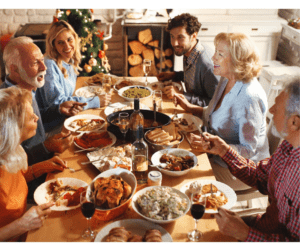
In the version we like to tell of the story of the first Thanksgiving, the settlers, and the native people, sat down together to a shared harvest feast. Putting aside whatever differences and misunderstandings they might have had, they expressed gratitude for the earth’s bountiful gifts. And we as a nation follow that ritual and practice as a national holiday, holding family centered meals and gatherings to this day.
Whatever inaccuracies there are in this story, it’s not farfetched to believe that the cultures represented, both Indigenous and Christian, appreciate the value of being grateful and giving thanks. Lakota author and activist Doug Good Feather writes of the connection between gratitude and generosity as he shares Indigenous wisdom and practices to help heal humanity. He sees gratitude as an internal characteristic, a feeling, and generosity as how we express that feeling out into the world.
I learned of this connection firsthand when I was organizing a project in the western part of Nebraska to assist social service agencies in meeting the needs of Native American and Mexican American clients. I had invited a Native American artist from the Eastern United States as a special guest lecturer, and she agreed to come on the date suggested, “as long as you can get me some cornbread,” she said. “I’ll be coming off a fast that evening, and we break our fast with cornbread.” There were several Native American women in my class, so I was confident that I could fulfill her request. When I asked the women, they were willing, but concerned about the type of cornbread since tribes tend to have their own recipes. “Any kind will do, Gaylynn told me, just so its cornbread.
So, the women brought the cornbread, and as they presented it, I noticed they seemed grateful, even honored to provide it. Later, when Gaylynn invited me to join her in the ritual she does to break her fast, I found myself in gratitude to Gaylynn for such a generous offer. Thirty years later, I still feel grateful for the whole experience of, what I came to call, the cornbread ritual.
Good Feather suggests,” When we engage with the world from a place of gratitude, it’s the difference between trying to make something happen and allowing something to happen, the defining difference between effort and effortlessness is the virtue of gratitude.” If we want to understand why gratitude is such a core concept of joy and well-being, “the ancestors tell us there are two primary reasons…a person cannot exist in a place of fear and true gratitude at the same time…. Secondly, Gratitude is the doorway to divine intuition, which allows us to be guided by our connection with the Creator.”
This year’s gathering at our table will be smaller than usual, but my wishes for myself and you are big–May we all have a generous and grateful Thanksgiving!
Doug Good Feather, Think Indigenous: Native American Spirituality for a Modern World, translated by Doug Red Hail Pineda (Carlsbad, CA: Hay House, 2021)

